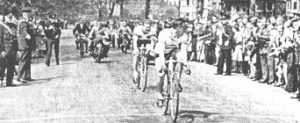The blitz of London in September 1940 brought the end of Henry Carpenter’s work in Islington. Already living in Teddington, Frank saw out the war in west London. What work he did is not clear – one possibility is that his skills were employed at Vicker’s aircraft factory in nearby Brooklands. If so he would have met members of the Guildford Charlotteville club.
Millions of young men were conscripted into the armies on both sides. Tony Merkens, the German Olympic champion and a great favourite of the British public, fought and died on Germany’s eastern front. Reg Harris, destined to be Britain’s multiple world sprint champion, drove a tank in Northern Africa. But enough young men were engaged in essential work at home for bike racing to continue through the war.…. and for young men of initiative to seize their opportunity.
1941 For the first time in 5 decades a massed-start road race was organised in Britain, from Llangollen to Wolverhampton. Taking advantage of traffic-free roads, Percy Stallard ran this road race in defiance of the NCU. Albert Price won from Cecil Anslow, who tellingly was riding on fixed gear.
Two closely linked issues started to influence cycle-sport development in Britain:
- the acceptance of continental-styled massed-start road racing;
- The question of gears. Hillier courses and the tactical demands of racing made geared systems imperative. But which technology to adopt? Sturmey-Archer hub gears were entrenched as the system of choice amongst Britain’s commuting and touring cyclists. On the continent racers were experimenting with different derailleur mechanisms….
1942 The breakaway British League of Racing Cyclists (‘BLRC’) was formed in defiance of the sport’s governing bodies. Years of acrimonious rivalry followed. Clubs either joined the ‘League’ or remained loyal to the ‘Union’. Shouts of ‘Up the league‘ rang out when club runs met. But it was worth it. Gradually and fitfully, Britain’s isolation from the continental racing scene began to heal In time the divisions healed too, a merger forced by the UCI growing tired of not knowing who to speak to. The British Cycling Federation was formed.
